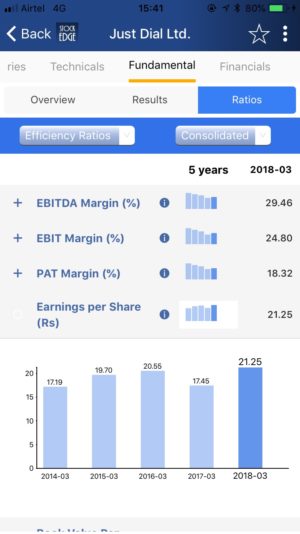Table of Contents
Earning per share is a very important parameter in a valuation ratio. It is an important parameter of fundamental analysis. Valuation ratios are used to determine the right price or time to enter into any stock. It is used to measure the right valuation metrics required to generate best return for your investment. We will discuss about one such ratio known as earnings per share which is one of the valued tool to determine the investment rationale behind any stock.
Earnings per Share (Rs)
Earnings per Share (Rs) measures the amount of net income earned per share of stock outstanding. In other words, this is the amount of money each share of stock would receive if all of the profits were distributed to the outstanding shares at the end of the year. EPS is calculated as Net profit divided by weighted average shares outstanding (as the number of outstanding shares keeps changing).
You can also watch the below video on Everything you want to know about Earnings Per Share (EPS):
Impact of Earnings per Share (Rs)
Earnings per share is also a calculation that shows how profitable a company is on a shareholder basis. So a larger company’s profits per share can be compared to smaller company’s profits per share. Obviously, this calculation is heavily influenced on how many shares are outstanding. Thus, a larger company will have to split its earning amongst many more shares of stock compared to a smaller company.
There are basically three types of EPS:
- Basic EPS: It is a rough measurement of company’s profit that can be allocated to one share of its stock. It does not factor in the diluted effect of convertible securities. Basic EPS is calculated as follows:
Basic EPS = (Net income – Preference dividend) / Weighted average no of share outstanding
- Diluted EPS: If a company has complex capital structure i.e. they have issued potentially dilutive securities, then diluted EPS is considered to be more precise metric than basic EPS. It takes into account all the outstanding diluted securities that could preferably be exercised and shows how such action would affect earnings per share. It can be calculated as:
Diluted EPS = {Net income – preference dividend (which are not convertible) + Interest on debenture (if such debenture is convertible)} / (Weighted average no of share outstanding + conversion of diluted securities)
- Cash EPS: Cash EPS or more commonly operating cash flow per share measures financial performance of the company. Free from non-cash items like depreciation which is included in basic EPS calculation, cash EPS may prove to be more reliable measure of financial and operational health of the company.
Higher the company’s cash EPS, better it is considered to have performed over a period. Formula for calculating company’s cash EPS is:
Cash EPS = Operating cash flow / Diluted shares outstanding
Formula:
EPS = (Net Income – Preferred dividends)/ Weighted average number of common shares outstanding
ABC Ltd has a net income of 1 million in the third quarter. The company announces preferred dividends of Rs 250,000. Total shares issued for the period was 12,000,000, with total shares outstanding at 11,000,000.
The EPS of ABC Ltd. would be:
EPS = (1,000,000 – 250,000) / 11,000,000
EPS = Rs 0.068
StockEdge App
We don’t have to calculate Earnings per Share on our own. StockEdge gives Earnings per Share of the last five years of any company listed in the stock exchange. We can look and compare Earnings per Share of any company and filter out stocks accordingly.
Suppose we want to look at Earnings per Share of Just Dial Ltd. of last 5 years. In the Fundamental tab of Just Dial Ltd., click on the fundamentals tab, we will get Ratios tab. Then in the Ratios tab click on Efficiency Ratios, Earnings per Share of Just Dial Ltd will show in a flicker of a second.

Bottomline
Earnings per Share is considered as the single most important variable determining the share price. It is also used in evaluating the company as it break downs profits per share basis. If you still do not have the StockEdge app, download it right now to use this feature. It is a part of the free offering of StockEdge App.
If you want to know more about this then click on this link









I wish to join online course on stock trading
Hello Sir, for that you can check courses on http://www.elearnmarkets.com